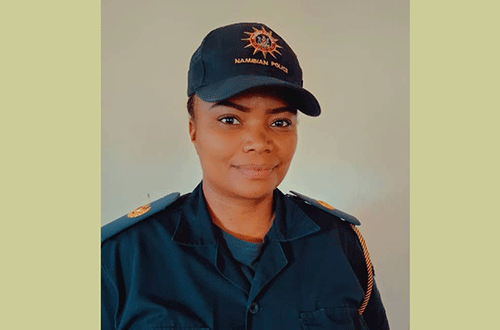Lahja Nashuuta
Warrant Henrietha Blockstein is a devoted public servant, who takes pride in her role at the Schlip police station in the Hardap region.
When asked about her favourite aspect of her job, she quickly responds: “What I cherish most is the uniform. I wear it like armour from God. It represents power, responsibility, and the trust bestowed upon me by the Inspector General of the Namibian Police Force.”
With over a decade of service in the Namibian Police, Blockstein officially became a public servant on 1 December 2010. Before this, she worked casually at Style Stores in Grootfontein.
As the Head of Administration, Blockstein handles various duties at the station. These include crafting awareness programmes, preparing and submitting reports to the regional headquarters, and overseeing the station’s financial documentation.
“I also manage all exhibits that have been seized, logged, and retained as court evidence. Additionally, I respond to all correspondence. My main role is to ensure the station runs smoothly and keep the regional commander informed by reporting through my station commander,” she elaborated.
Originally from Grootfontein in the Otjozondjupa region, Blockstein completed her Grade 12 in 2006.
“I genuinely enjoy engaging with people,” she mentioned.
She actively contributes to her community, serving on the school board at Matheus Hansen Primary School in Schlip and as treasurer of the Namibian Association of Children with Disabilities in Mariental.
Furthermore, she is a founding member of a newly established special education programme for children with special needs.
When asked if joining the police force was her dream career, Blockstein honestly replied, “Truthfully, policing was never my first choice. I was chasing a law degree, which had been my dream since fifth grade, and I completed two years of study. However, due to financial limitations and becoming a mother at 21, I had to accept the application my mother submitted for me,” shared the civil servant.
Reflecting on her journey, she views the police force as a path that enhanced her understanding of the justice system.
“It deepened my knowledge of criminology and illustrated how policing connects with the legal framework. It is often stated that some of the best lawyers emerge from the Namibian Police Force,” she noted.
Challenges
Blockstein cites the language barrier as a major challenge in her work. Given Namibia’s multicultural and multilingual society, a lack of fluency in local languages can impede effective service delivery. Fortunately, the Namibian Police Force is addressing this issue by providing language courses.
She also pointed out the absence of interconnected systems among key departments such as NAMPOL, Immigration, NATIS, and Customs.
“This separation results in inefficiencies, such as drafting letters and waiting three to five business days for replies, when integrated systems could allow for immediate access and enhance service delivery,” she said.
Social constraints and public perceptions weigh heavily on police officers.
“We forfeit our social lives, become overly wary, and are seen solely as authority figures. Yet, people often forget that we are human, experiencing fear, pain, and stress too. This pressure can result in mental health issues such as anxiety or depression,” said Blockstein.
Despite these challenges, she finds great fulfilment in her work.
“What I value most is serving the community—socially, personally, or through law-enforcement. Building genuine relationships, bringing joy to others, ensuring safety, and upholding the fundamental duties of the Namibian Police Force is incredibly rewarding,” she shared.
Through community outreach and education, she empowers citizens.
“We educate people about the Namibian Constitution, tackle social challenges like alcohol abuse, gender-based violence, and child neglect, and assist with social grant applications. Additionally, we identify silent crimes and support victims who can’t advocate for themselves,” she added
Memorable moments
Reflecting on her career, she recalls being a new officer during a significant field fire in the Gibeon area.
“Together with officers and the Mariental fire brigade, we battled flames that had already claimed livestock and endangered nearby homes. Lacking sufficient water, we used blankets and improvised extinguishing methods, yet we succeeded in controlling the fire.
Though I was scared, I felt an enormous sense of pride. We saved lives,” she reflected Blockstein. Another profound experience was when a man attempted suicide and was brought to the station by his father.
“I spent three to four hours conversing with him, reminding him of the value of life. Today, he greets me with a hug and a smile, full of vitality. That’s a success I will cherish forever,” shared the policewoman.
Among her proudest achievements, she lists receiving her 10-year service medal from the late President Hage Geingob and reaching the rank of Warrant Officer Class 2 at the age of 35.
Addressing common misconceptions, she stressed the Namibian Police Force’s commitment to quality service.
“Yes, we encounter challenges, and investigations take time, but justice is served. With community collaboration, we have significantly decreased crime in our region,” she said.
Looking ahead
Blockstein does not envision retirement from the police force.
“I genuinely love my work. The support I receive from the Namibian nation is unmatched,” she stated.
She expressed her ambition to be an influential peace officer and a role model for aspiring female officers, similar to Deputy Commissioner Ruhl and her current regional commander, Commissioner Sydney Philander.
“Most importantly, I strive to honour my late mother’s memory. She had faith in the uniform, and I am eternally grateful that she applied for me to join the force,” said Blockstein.
-lnashuuta@nepc.com.na



